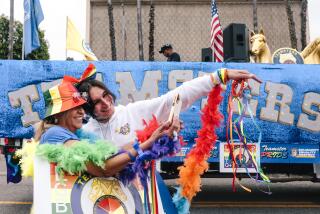LABOR : Union Reformers Taking a Back Seat to Outsiders in Cleanup of Teamsters
- Share via
WASHINGTON — When Ron Carey stood on the marble steps of Teamsters headquarters in bright sunshine one day last February, he promised in his inaugural address that he would use the power of his presidency to rid the nation’s largest trade union of the persistent curse of Mob influence.
Elected two months earlier in the first-ever direct election of a Teamsters president, Carey and all 15 members of his reform slate were swept into positions of leadership on pledges to continue a two-year-old cleanup being supervised by the federal courts.
Since then, Carey’s cleanup has moved slowly, if at all. A Justice Department official who monitors the union says it is too early to render any harsh judgments. But the momentum for the cleanup has come not so much from Carey as from court-appointed supervisors who continue to look over his shoulder, and it is a process that may last for years.
One of Carey’s first actions, in fact, has gone against the tide. His appointment of veteran Teamster William F. Genoese as temporary trustee of a troubled New York local has been vetoed by Frederick B. Lacey, the court-appointed administrator, on grounds that it would “further an act of racketeering activity” within the Teamsters.
In a sharply critical report to Carey, Lacey said Genoese had “a sad record” of fighting corruption while representing cargo handlers at John F. Kennedy Airport, that he had been aligned with old-guard elements in the Teamsters and that he had lied under oath about his efforts to secure his appointment as trustee. Carey subsequently withdrew the appointment.
U.S. District Judge Eugene H. Nickerson settled the situation by appointing Thomas Puccio, a former federal prosecutor, as permanent trustee of troubled Local 295, where two past presidents were convicted of misusing their union offices and one was found to be a member of the Mafia.
Puccio, the assistant U.S. attorney in Brooklyn who successfully prosecuted the Abscam congressional bribery scandal, has since chosen as his deputy Michael Moroney, a former member of the Labor Department’s Office of Labor Racketeering.
Some Teamster-watchers believe that Lacey and Carey may wind up clashing over the union’s competence to clean up its affairs. Lacey, a former federal judge and former prosecutor, was named in 1989 to head a three-member task force to rid the Teamsters of the decades-old influence of organized crime.
A second member of the task force, attorney Charles M. Carberry, has been the investigations officer. Over the last three years, Carberry, who once prosecuted securities fraud cases for the government, has filed disciplinary actions against 170 national and local Teamster officials. More than 50 have resigned from office, and 22 others have signed agreements to repay union money they allegedly misspent.
In most of the remaining cases, Lacey has conducted hearings and has upheld Carberry’s charges that individual Teamsters should be temporarily suspended or permanently barred from union activities for having associated with known criminal figures.
The third task force member, Michael Holland, last December successfully supervised the union’s first national election in which members voted directly for top officers. It resulted in the election of Carey and his reform slate. Previously, Teamster presidents and executive board members had been chosen by delegates to the union’s triennial convention.
Lacey, although criticizing Carey’s appointment of Genoese, has taken pains to commend the union’s new executive board for establishing an ethical practices committee and for pledging “sound financial policies” to spend members’ dues wisely.
Carey, a former United Parcel Service driver who headed a Long Island Teamster local, also has sought to symbolize his reform movement by cutting back his presidential salary from $225,000 to $175,000 and by selling the union’s limousine and its two executive jets.
But Lacey, in the long run, may hold the real power for reform. According to a 1989 court agreement, when he and the other court supervisors are phased out next October, Lacey will assume a new but similar role. He will become the government’s representative (and probably the chairman) on a court-mandated Independent Review Board that will include a Teamster appointee and will have authority in perpetuity to investigate any union misconduct. The board will make recommendations to Carey, but it is guaranteed the final word on implementing them.
More to Read
Sign up for Essential California
The most important California stories and recommendations in your inbox every morning.
You may occasionally receive promotional content from the Los Angeles Times.










